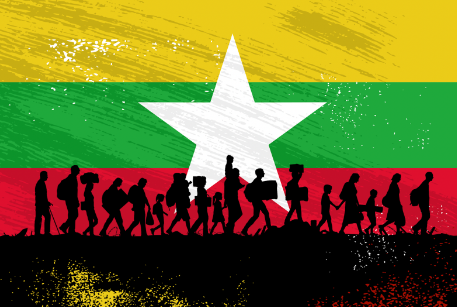Silent Suffering: The Urgency of Sustainable Solution to the Rohingya Refugee Crisis

By Frizia Rounak / GICJ
The Rohingya Refugee Crisis began in 2017 and has been an ongoing battle for the last six years for millions. The Rohingyas today face one of the world’s worst humanitarian crises, riddled with extreme poverty, which was further exacerbated by the COVID-19 pandemic resulting in a significant drop in global health and humanitarian assistance. Close to a million Rohingyas were forced out of their homes to escape a brutal military crackdown, which the UN human rights chief characterised as genocide. They now live in the crowded camps in Bangladesh, the largest concentration in the world, relying on humanitarian assistance for food, water, shelter, health services and other essentials [2]. For the last few years, the international community has pledged more than US $344 million to urgently ramp up the delivery of critical humanitarian assistance to Rohingya refugees and host communities in Bangladesh [1].
International aid for the Rohingyas and other vulnerable communities, such as Ethiopia, Uganda, and Zambia has been on a downward trend since 2020. However, this reduction in food assistance will have significant global implications, exacerbating risks of starvation and malnutrition among Rohingya refugees, particularly vulnerable groups such as women, children, and the elderly. In addition, this lack of adequate nutrition and food security will likely increase the risk of disease outbreaks, particularly in overcrowded and unsanitary living conditions, which could further affect the wider community. These global implications result from political instability and conflict, which demands the need for coordinated international responses to address such crises with sustainable solutions to provide their fundamental rights to these refugee populations and prevent the recurrence of such tragedies.
UN agencies such as the UN Refugee Agency (UNHCR) and the WFP have continuously helped sustain the Rohingya communities through donations and other assistance provided by member states. However, in the second week of February 2023, the WFP announced its decision to cut the food rations of Rohingya refugees in Bangladesh by 17%, citing a sharp drop in international funding as the reason behind the decision [6]. Furthermore, the UN has warned of further cuts in April if donations do not increase [4]. This grim news of the reduction in aid will yet again have devastating effects on the Rohingya refugee population and worsen the situation of those already struggling with malnutrition and food insecurity, having long-term repercussions. This is a critical situation that will result in serious consequences such as increased malnutrition and even death if food assistance is not provided and as such demands urgent response from the international community [5].
Food is a basic human need, and this constant reduction in food assistance has violated numerous fundamental rights of the Rohingya refugees, guaranteed by international human rights law. Evidently, this has exacerbated the already dire living conditions and poor nutrition levels in the overcrowded refugee camps, which can lead to life-threatening health conditions like severe acute malnutrition [3]. As these vulnerable people become more susceptible to infections and lack access to proper healthcare services and institutions, the constant failure of the international community to ensure the welfare of refugees has violated their right to life, survival, and health. As millions now struggle to meet their basic needs for food, shelter, and healthcare, Rohingyas and other refugees experience an increase in the risk of exploitation and abuse, especially as they resort to negative coping strategies such as child labour, early marriage, or prostitution to survive [7]. This existing systemic discrimination and persecution in their home country, Myanmar, has not only violated their right to non-discrimination but also further perpetuated their marginalisation and exclusion from society.
For years , the international community has turned a blind eye to the crisis and has failed to act as necessary and urgently. The world must stand up and denounce the atrocities being committed against the Rohingya people and demand an end to the violence against them. It is a global responsibility to protect the innocent lives of the Rohingyas and their families. The people of Myanmar have experienced both peaceful protests and violent riots across the country, demonstrating against the government’s continued suppression of the Rohingya people. Donors too, must stand up for the rights of the Rohingya people and demand that the government stop its ongoing violations of their rights.
Geneva International Centre for Justice (GICJ) urges the international community and all donors to continue to provide emergency assistance to the Rohingya population as well as to other victims of these heinous crimes in order to address this issue. We also urge the government of Bangladesh to ensure that the human rights of the Rohingyas are respected and upheld, and that they are given access to all essential services. We recognize that it is essential to address the underlying causes of the crisis, such as the discrimination faced by the Rohingya in their home country - Myanmar. We must all work together to ensure that the Rohingya are allowed to return to their homes in a safe and dignified manner and enjoy their fundamental human rights guaranteed by international law. As the international community constantly demands justice and accountability for Rohingya refugees, we must all remember that “those in the camps need more than just words and statements of solidarity” [3].
Myanmar, Rohingyas, Minority rights, rations cuts, fundamental rights, Rohingya refugees, international human rights law, international aid, humanitarian assistance, World Food Programme, Bangladesh, emergency assistance
Sources:
[2] https://www.unhcr.org/en-us/rohingya-emergency.html
[3] https://news.un.org/en/story/2023/02/1133597
[5] https://www.wfp.org/news/lack-funds-forces-wfp-cut-rations-rohingya-bangladesh









